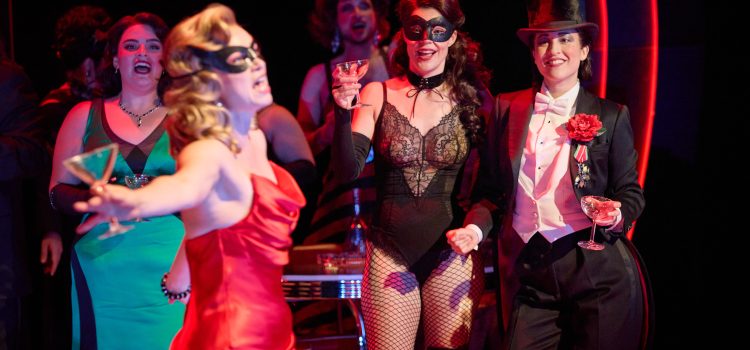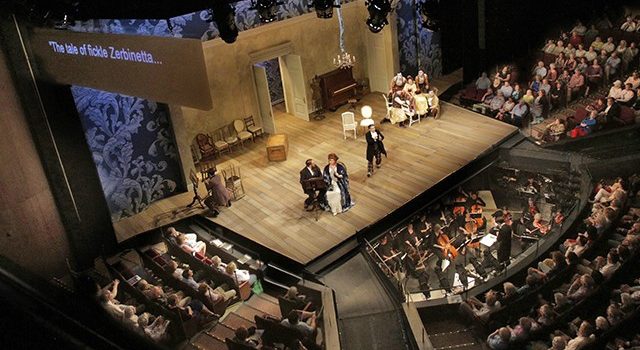By CB Adams
“Die Fledermaus” is a sparkling comedy of mistaken identities, romantic mischief and champagne-fueled revenge. In Opera Theatre of Saint Louis’s new production, director Shawna Lucey reimagines Johann Strauss II’s classic operetta in the sleek, high-society world of 1960s Manhattan, where cocktail culture and social games set the stage for elegant chaos.
But within this stylish interpretation, there’s something a little new: theft. This “Die Fledermaus” gives new meaning—not just of time and trust, but of the spotlight itself. Nearly every performer finds a moment (or more) to dazzle, tease or upend expectations, and by the curtain call, the show has delivered its comic comeuppance—and it’s stolen your heart. What a way fabulous and fun way to start the company’s current four-opera festival and celebrate its 50th year!
OTSL’s “Die Fledermaus” is a fizzy, stylish delight, reimagining Strauss’s operetta in the sleek, mid-century world of sharp tailoring, cocktail culture and social intrigue. Director Lucey leans into the era’s glamour and satire, crafting a production that feels timeless and freshly minted. The setting proves an ideal backdrop for the operetta’s themes of disguise, flirtation and comic reckoning.
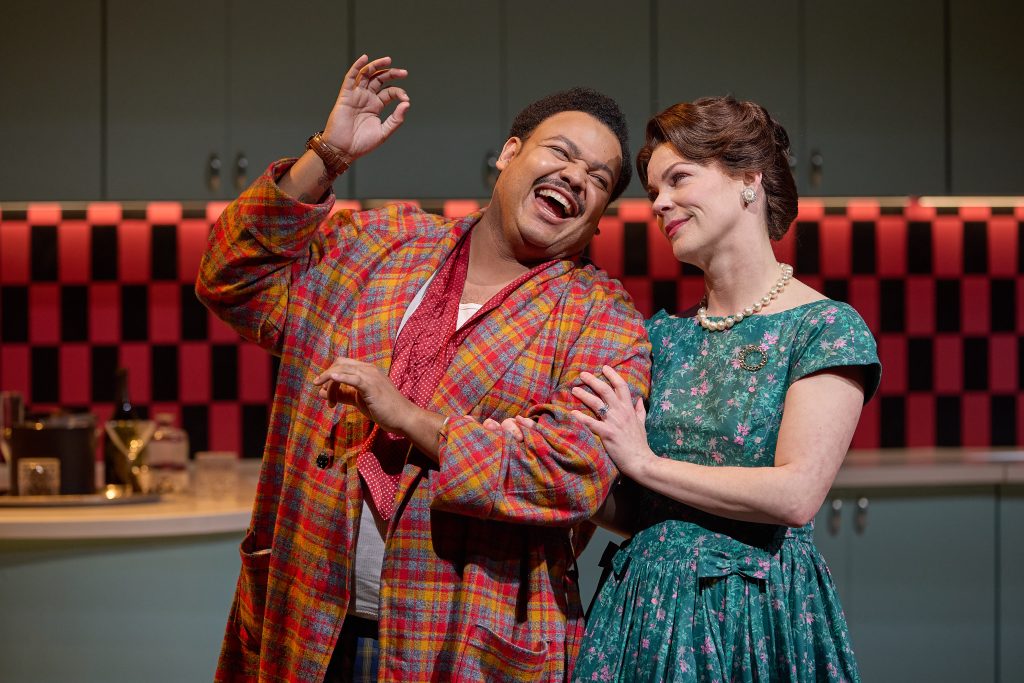
Two scenes in particular showcase the production’s inventiveness and theatrical flair. One is the Act II party, relocated to Prince Orlofsky’s Manhattan penthouse shaken and stirred with a dazzling swirl of martinis, mod fashion and musical mischief. The party becomes a playground for mistaken identities and social games with Kelsey Lauritano’s delightfully eccentric Orlofsky presiding over the chaos like a bemused Warholian host.
Lauritano’s smoky, wine-dark mezzo and magnetic presence give the character a cool detachment and sly charisma. Channeling a touch of Judy Garland glam, Bob Mackie sparkle and the cool mystique of Marlene Dietrich—think, too, of Maurice Chevalier with a Russian accent—she transforms the traditionally male role into a showcase of flair and effortless command.
Sara Gartland shines as Rosalinde, bringing vocal radiance and comic precision to a role that demands transformation and versatility. Her journey from a weary, overlooked housewife to a commanding Hungarian countess is one of the production’s most fun performances.
The role calls for lyrical warmth and agile coloratura, especially in the aria “Klänge der Heimat,” where Gartland’s expressive phrasing and technical finesse reveal Rosalinde’s emotional depth and theatrical flair.
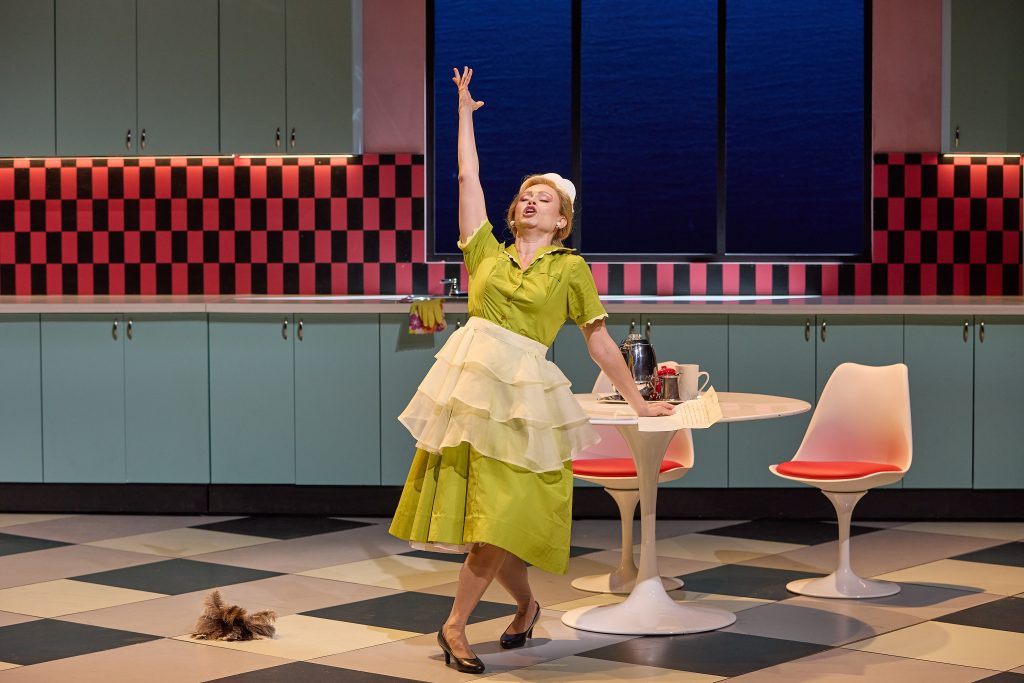
Deanna Breiwick’s Adele, masquerading as an actress, seizes every comic beat with sparkling wit and vocal agility, her luminous soprano effortlessly navigating the role’s coloratura flourishes. With a stage presence that radiates charm and precision, she blends vocal athleticism with a keen sense of comedic timing, making each moment feel both spontaneous and impeccably crafted.
The visual centerpiece of this production is Robert Innes Hopkins’ dazzling set for the Act II party at Prince Orlofsky’s penthouse—a gleaming, mid-century Manhattan fantasia that perfectly captures the production’s blend of elegance and irony. Known for designs that marry classical structure with theatrical flair, Hopkins creates a space that feels both expansive and intimate, a playground for disguise and deception bathed in sleek lines and shimmering surfaces.
His costume designs are equally impressive, with every character—from leads to ensemble—dressed in looks that evoke period glamour with a wink of camp. Even background figures are meticulously imagined, including one party guest who looked like a vintage Barbie doll come to life, adding layers of visual delight to an already sumptuous scene.
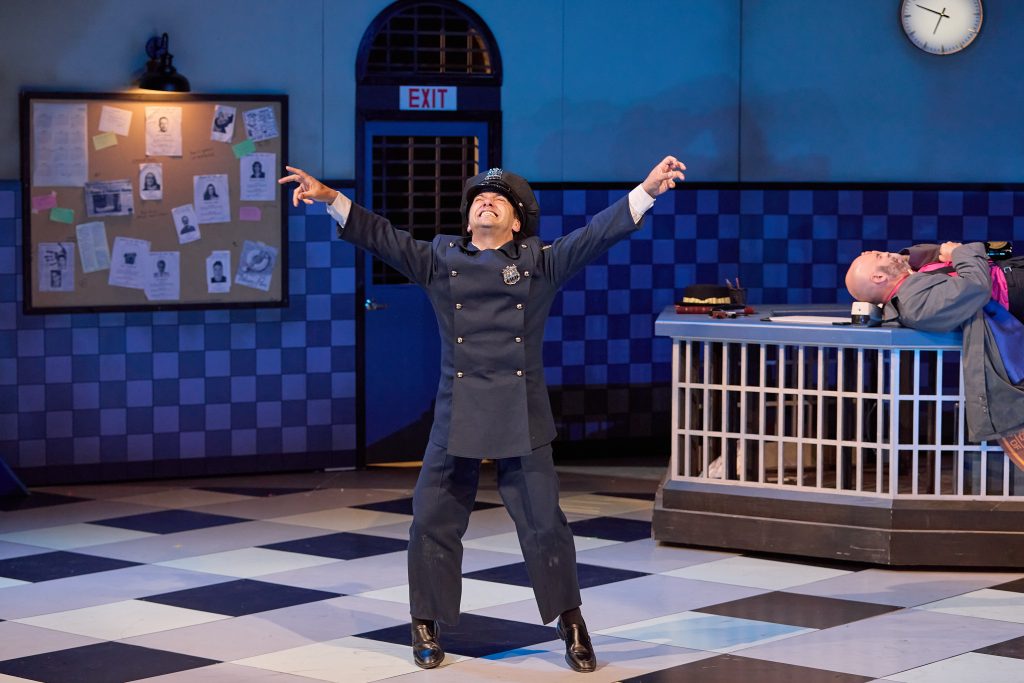
The other showstopper is the Act III police station scene that shifts gears into full farce, set in a stylized, grungy precinct with “NYPD Blue” and “The French Connection” vibes. Here, the production leans into physical comedy and improvisational energy, with Oscar Olivo’s Frosch, delivering a riotous performance as a world-weary jailer whose antics nearly steal the show.
Robert Mellon’s Frank, the prison warden, is a comic gem, and the ensemble’s timing is razor-sharp. The scene’s loose structure allows for playful invention, and this cast makes the most of it, turning bureaucratic absurdity into comic opportunities.
The cast is uniformly strong, brimming with vocal brilliance and sharp comedic instincts. It’s not easy to pinpoint who deserves the most credit—the singers, Lucey or choreographer Seán Curran—for sustaining such energetic, physically demanding movement across the stage while maintaining vocal clarity. It’s a shared achievement that speaks to the production’s careful coordination and the performers’ versatility.
Edward Nelson’s Gabriel Von Eisenstein is a suave, self-assured figure whose downfall is as satisfying as it is hilarious. Johnathan McCullough brings suave authority to Dr. Falke, his baritone warm, polished, and effortlessly expressive. He shapes each phrase with clarity and control, balancing elegance with a knowing wink.
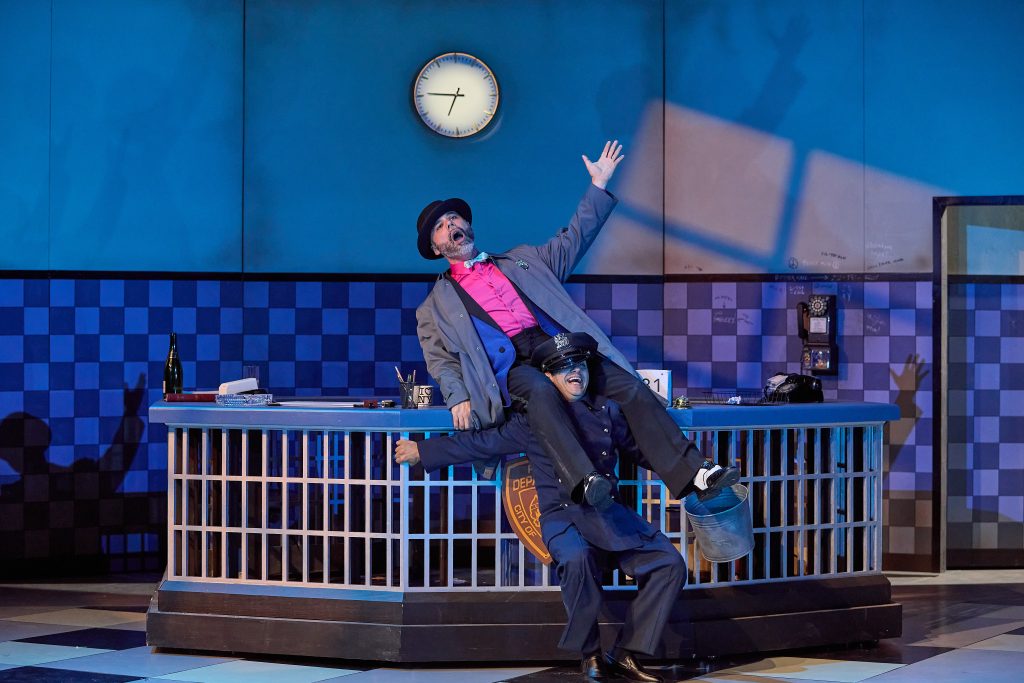
Joshua Blue is a scene-stealing (but not too scene-stealing) Alfred, reveling in the character’s theatrical bravado and romantic delusions. His tenor is vibrant and ringing, with a golden tone that soars through Strauss’s lyrical lines. Blue’s voice combines power and warmth, and he uses it with a natural ease that makes Alfred’s over-the-top antics feel hilarious and oddly endearing. His comic instincts are sharp, but it’s the sheer beauty of his singing that elevates the performance beyond caricature.
Sophia Baete brings youthful energy and vocal clarity to Sally, Adele’s sister. Her agile, expressive mezzo and confident stage presence make her a memorable part of the ensemble.
Gregory V. Sliskovich is another comic standout as the hapless lawyer, Dr. Blind, delivering his lines with crisp timing and a keen sense of physical humor. His tenor is bright and flexible, lending a buoyant energy to the role that enhances the character’s frantic absurdity without ever losing vocal finesse.
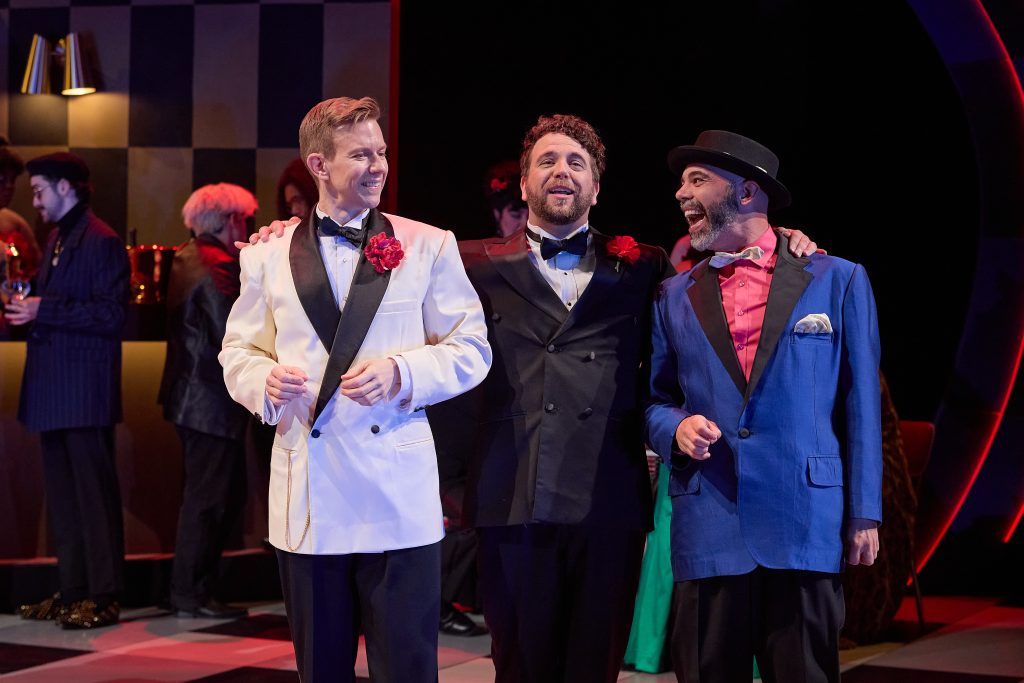
With gorgeous singing, razor-sharp comic timing and a setting that breathes new life into Strauss’s classic, “Die Fledermaus” at OTSL is a jubilant blend of tradition and reinvention—just as Strauss might have imagined. In the week leading up to the performance, I met three people who admitted they’d never been to an opera and found the idea intimidating. I suspect many opera-goers know people like that.
This production is the perfect invitation—accessible, effervescent and irresistibly fun. And in a time when the arts need all the support they can get, buying a ticket and bringing a newcomer isn’t just a good night out—it’s an investment in the future of live performance.
Opera Theater of St. Louis’ “Die Fledermaus” runs in repertory as part of their festival season through June 29. Visit https://opera-stl.org/.
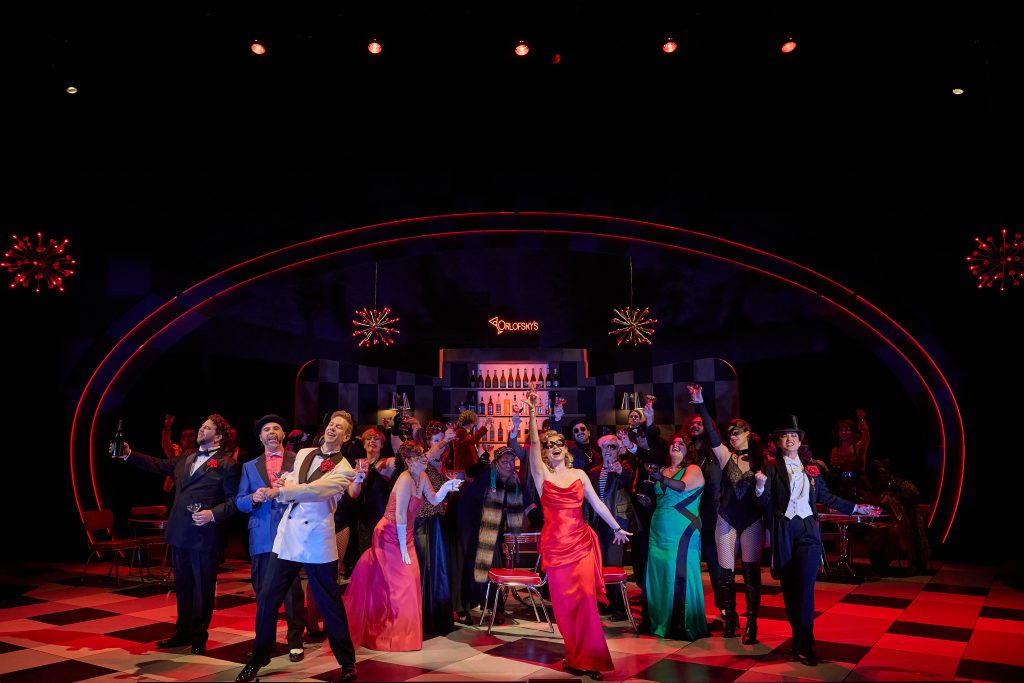

CB Adams is an award-winning fiction writer and photographer based in the Greater St. Louis area. A former music/arts editor and feature writer for the St. Louis Globe-Democrat, his non-fiction has been published in local, regional and national publications. His literary short stories have been published in more than a dozen literary journals and his fine art photography has been exhibited in more than 40 galley shows nationwide. Adams is the recipient of the Missouri Arts Council’s highest writing awards: the Writers’ Biennial and Missouri Writing!. The Riverfront Times named him, “St. Louis’ Most Under-Appreciated Writer” in 1996.

